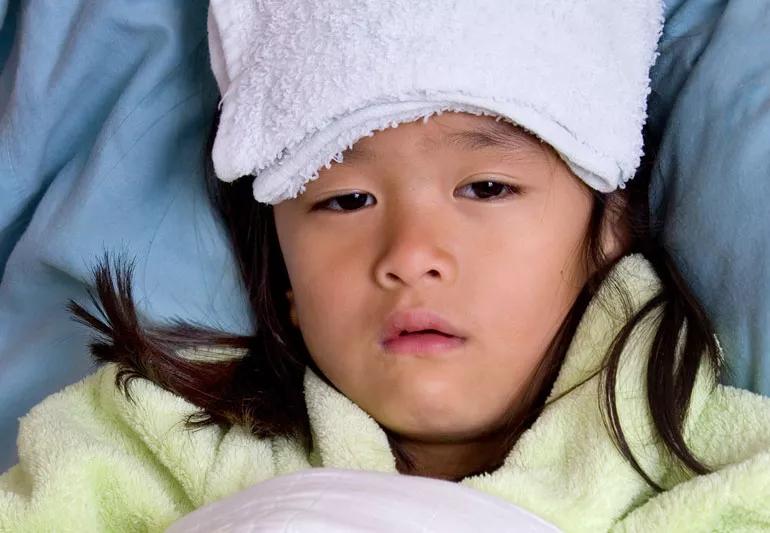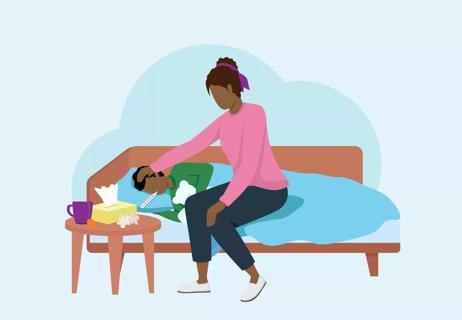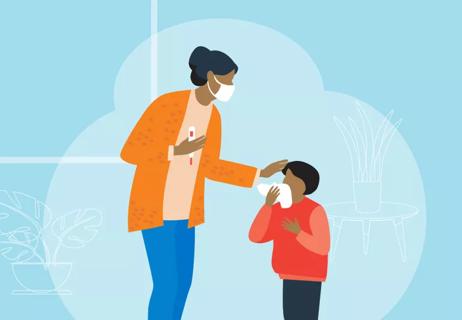It can cause alcohol poisoning and other serious health issues, especially in kids

An old folk remedy passed down from previous generations says that applying rubbing alcohol to the skin can bring down a fever. But some advice — including this dangerous suggestion — is better left in the past.
Advertisement
Cleveland Clinic is a non-profit academic medical center. Advertising on our site helps support our mission. We do not endorse non-Cleveland Clinic products or services. Policy
This so-called home remedy is actually an extremely unsafe practice that can cause severe health issues.
Pediatrician Maureen Ahmann, DO, explains what you need to know about rubbing alcohol and why you should never apply it to your or your child’s skin to try to treat a fever.
“Do not wipe your child down with rubbing alcohol,” Dr. Ahmann stresses. “It can ultimately be more dangerous for your child than the fever itself.”
Rubbing alcohol is a household chemical product made with isopropanol, also known as isopropyl alcohol or 2-propanol. It has a variety of uses, including disinfecting surfaces and, when used in very small amounts, cleaning bug bites and piercing sites.
Rubbing alcohol on the skin can provide a temporary cooling effect, which is why it might seem like a good move to treat a fever. But that effect is fleeting, lasting for just a minute or two — and more importantly, it can cause severe health issues.
Think about what happens to a product after you put it in your skin: It soaks into your skin, but then what?
“Products that you apply to the skin are then absorbed through the skin and into the body,” Dr. Ahmann explains. If what you’re putting on your (or your child’s) skin is dangerous, it can cause health problems once it sinks in.
Advertisement
As its name suggests, rubbing alcohol contains alcohol. Once it’s absorbed into your child’s skin, it enters their bloodstream, which can cause serious and even life-threatening changes in their body’s ability to function.
That includes:
All of these issues can lead to permanent brain damage or even death.
“The potential side effects are so dangerous that you should never apply rubbing alcohol to the skin to try to bring down a high temperature,” Dr. Ahmann reiterates.
First, remember that a fever is actually a sign that your child’s body is trying to fight off a virus or an infection — which means it’s not always a cause for concern. Sometimes, fevers aren’t accompanied by any symptoms, and in these cases, all you need to do is keep an eye on your child and watch for any escalating concerns.
“If they’re running around and playing, you don’t have to worry about it too much,” Dr. Ahmann says. “The only reason to treat a fever is to make your child more comfortable.”
If your child is especially uncomfortable, like if their spike in temperature is brought on by the flu or another illness, there are a few things you can do while you wait for their fever to break.
“You can put a cool washcloth on their forehead, back or under their arms,” Dr. Ahmann advises, “and you can give them a lukewarm bath or shower — but not a cold bath, which can actually raise their temperature even further.”
If your child is under 6 months old or if their fever hasn’t come down after a few days — or if you have any other questions or concerns about how to treat them — call their pediatrician’s office to ask for individualized guidance.
Advertisement
Learn more about our editorial process.
Advertisement

Any fever, especially one of 100.5 degrees Fahrenheit or higher, should trigger a call to your oncologist — and maybe a trip to the ER

A combination of rest, fluids and over-the-counter medications can help you feel better fast

When your body is fighting infection, your internal temperature rises as a defensive response

Most cases are mild and can be treated at home, but some situations may require medical care or a trip to the ER

It’s important not to give them fever-reducing medications right off the bat

Is it just a passing chill or something more serious?

What you need to know about these common misconceptions

Wearing a scarf, adjusting your outdoor activities and following your asthma treatment plan can help limit breathing problems

Your diet in the weeks, days and hours ahead of your race can power you to the finish line

When someone guilt trips you, they’re using emotionally manipulative behavior to try to get you to act a certain way